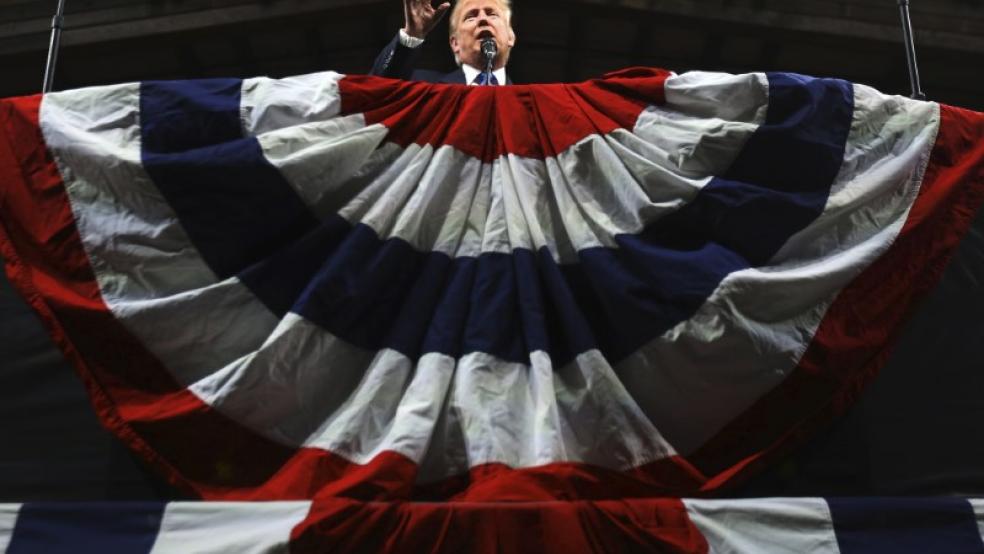“Rigged” is a word that’s been tossed around a lot in this election cycle, rivaled perhaps only by “crooked” and “amazing.”
During the run-up to the general election campaign, Donald Trump talked about the Republican primaries being rigged. He has railed endlessly about “the system” being rigged. And he has suggested that the election itself could be rigged.
On the other side of cranky, Bernie Sanders grumbled that the Democratic nominating process, in which he was ultimately vanquished by Hillary Clinton, was rigged.
Related: Why Trump’s Claims of a ‘Rigged Election’ Are Not That Far-Fetched
Sander’s complaint was not without merit. As the Democratic National Convention got under way in late July, hacked emails released by WikiLeaks revealed that the Democratic National Committee under now-ousted chairwoman Debbie Wasserman Shultz, a representative from Florida, had promoted the candidacy of Hillary Clinton while working to undermine the insurgent challenge by Sanders.
Trump had a point, too, when he tweeted in April about the presidential debates being rigged. But he was only half right when he said “Hillary & the Dems” were doing the rigging.
In fact, the rigging of the presidential debates is done jointly by the Democratic and Republican Parties.
The Presidential Debate Commission (PDC) is a cartel controlled by those two big businesses, and they don’t like small enterprises such as the Libertarian Party and the Green Party horning in on the action.
If you don’t believe that the commission is an arm of the political Establishment, just look at who sits on the board that decides what the criteria are for inclusion in the debates.
The co-chairmen are Frank J. Fahrenkopf Jr., former chairman of the Republican National Committee and a former lobbyist for the gaming industry, and Mike McCurry, former press secretary to President Bill Clinton and counsel to the lobbying firm Public Strategies Washington. Among PSW’s clients are Bain Capital (onetime home of defeated GOP presidential candidate Mitt Romney), Bristol Myers, Lockheed Martin, NASDAQ, United Technologies and the U.S. Chamber of Commerce.
The current board includes a who’s who of the Establishment names and one percenters: Richard Parsons, former chairman of Time Warner; Jane Harman, former Democratic representative from California and wife of the late multimillionaire Sydney Harman; Olympic Snowe, former U.S. senator from Maine; businessman Howard Buffett, a son of billionaire Warren Buffett; former Republican Senator John Danforth of Missouri; Purdue President Mitch Daniels, a onetime GOP presidential hopeful and former governor of Indiana; former Federal Communications Commission chairman Newton Minow, plus a smattering of academics and journalists.
Under the criteria the commission set for 2016, “candidates must appear on a sufficient number of state ballots to have a mathematical chance of winning a majority vote in the Electoral College and have a level of support of at least 15% of the national electorate as determined by five selected national public opinion polling organizations, using the average of those organizations' most recently publicly-reported results at the time of the determination. The polls to be relied upon will be selected based on the quality of the methodology employed, the reputation of the polling organizations and the frequency of the polling conducted.”
Related: Polls Tighten, but the Electoral College Map Tells a Different Story
In setting its rules, the commission noted that hundreds of people declare their candidacies for president, and that’s true. But only four this year are on enough ballots to have that mathematical chance of getting enough votes in the Electoral College.
But while the candidates of the two parties controlling the commission will be included in the debates, Gary Johnson of the Libertarian Party and Jill Stein of the Green Party are likely to be excluded because they don’t meet the arbitrary 15 percent support as determined by the PDC. Johnson is on the ballot in 49 states, plus the District of Columbia; Stein is currently on the ballot in 47 states, including D.C., and is waiting to hear from Rhode Island.
Fahrenkopf and McCurry, the political operatives and lobbyists who sit atop the commission, said in a joint statement: "We are mindful of the changes in the electorate and the large number of voters who now self-identify as independents. We believe our candidate selection criteria appropriately address this dynamic. The CPD's criteria make participation open to any candidate, regardless of the candidate's party affiliation or status as an independent, in whom the public has demonstrated significant interest and support."
Related: Third Party Candidates Johnson and Stein Suddenly Hit a Rough Patch
While that all sounds laudable, the truth is that when the debates are held, in all probability the country will hear only from the two most reviled candidates in recent political memory. Shouldn’t the reality that a huge swath of voters don’t really want either Clinton or Trump be taken into account?
Even with the news today that Stein is facing vandalism charges and Johnson didn’t know what or where the battle-scarred Syrian city of Aleppo was, why should they not be heard when America remains hungry for fresh voices – especially those, as the popularity of Bernie Sanders demonstrated, who speak truth to power.
The commission has not yet formally declared who will be allowed to make their case to our disheartened and divided country. It still has time to represent America, not the special interests of the political Establishment.






